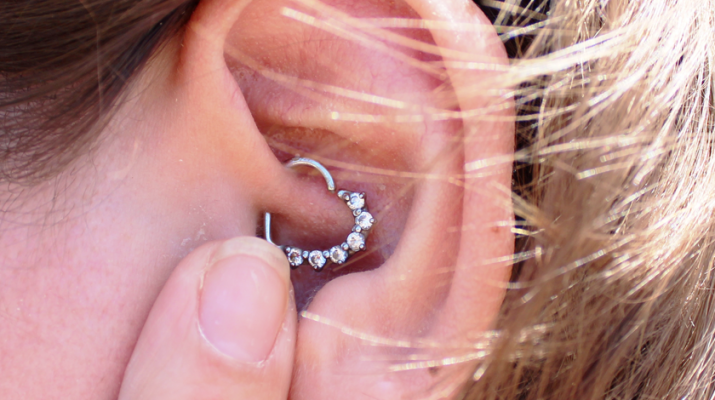By Deborah Jeanne Sergeant
Most people get body piercings because they like the style; however, a few seek a specific piercing because it’s believed to help reduce the symptoms of migraine headaches.
Anecdotally, piercing the daith (some pronounce it to rhyme with “goth”; others rhyme it with “faith”) is said to lessen the pain, nausea, light sensitivity and other migraine symptoms. Those who use it claim that piercing the ear in its innermost fold of cartilage just above the ear canal turns off migraine pain in a similar way to acupuncture.
Andrea Schilling, licensed acupuncturist at Acupuncture Works in Williamsville, said that she has explored the daith piercing for a patient.
“It seems there’s no correlation with acupuncture points,” Schilling said, “but I do believe just like anything it may be a placebo effect, because I have patients that have benefited from this.”
Medical research into daith piercings would likely be difficult because so many different factors can affect migraine headaches, including the placebo effect.
Herbert Lau, licensed acupuncturist at King’s Acupuncture & Wellness Center in East Amherst, said that daith piercing is just a fad.
“About four to five years ago, they came up with daith piercing for weight control,” he said. “They said it had to do with digestion. It’s not an acupuncture point.”
People performing the piercing most likely have no training in treating migraines or in acupuncture.
“If you believe it will work, you can do acupuncture, not piercing,” Lau said. “We do acupuncture, but not at that point on the ear.”
He added that the piercing is a permanent placement and can cause scarring, unlike acupuncture needles.
“Daith piercing is done in a tattoo parlor, not a medical setting,” he said. “It’s not as clean and there’s chance of infection.
Lau said that sometimes stress, hormones and other factors cause migraines. By eliminating other factors in conjunction with acupuncture and Chinese herbs, Lau said he offers a holistic treatment for migraine.
As for those who claim they received relief from a daith piercing, he said that it’s likely a placebo effect.
“There’s no acupuncture basis for daith piercing in Chinese medicine,” Lau said. “There’s no point in the ear that’s good for migraine headaches. It’s a fad. We do points on the scalp and head in acupuncture, not the ear.”
Before obtaining a daith piercing, it’s also important to realize how different it is from standard earlobe piercing. Many shopping mall jewelry stores perform only lobe piercing because of its low rate of infection and other complications but refuse to pierce cartilage because it’s more complicated — and painful. People seeking a daith piercing must go to a stand-alone piercing business.
The daith piercing is tricky to keep clean because for many people, their hair touches the piercing more often and because it’s tucked into the innermost crease of the ear. The position also makes turning the piercing stud difficult. Piercing studs must be turned to facilitate healing. Should the daith piercing not help reduce migraine pain, the earring may be removed to allow the piercing to close; however, it will likely leave a scar.
Before undertaking a daith piercing, discuss the possibility of complications with a health care provider.

